Refused to take an hour call so now y’all gotta go in … seems about right … you didnt stand up for your co workers .. you instead ruined it for them.. wtg
I Refused to Take Video Calls on Weekends, Now HR Changed Their Policy
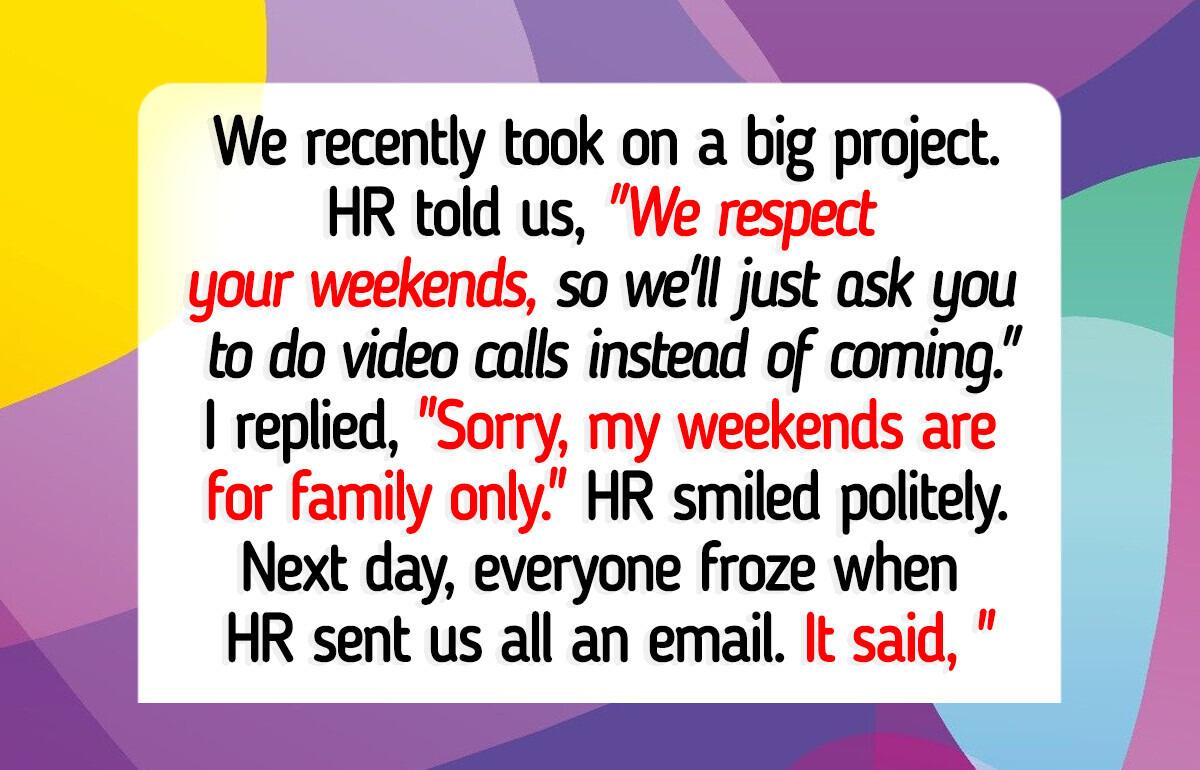
Balancing work and personal life has become harder than ever, especially when companies expect employees to be available around the clock. What may seem like a small refusal to work outside office hours can sometimes trigger big consequences at the workplace. Recently, one of our readers sent us a letter about experiencing this exact situation with HR.
Dear Bright Side,
I work in a design company. We recently took on a big project with a tight deadline, so we need to work more hours. HR told us, “We respect your weekends, so we’ll just ask you to do video calls instead of coming in.”
No one said a word. But I replied, “Sorry, my weekends are for family only. I can’t be doing work.” HR smiled politely. That’s when some of my colleagues started to agree with me.
The next day, everyone froze when HR sent us all an email. It said:
“Dear Colleagues,
As we move forward with an important project under tight deadlines, we ask for your full commitment over the coming months. To support this, we require your physical presence in the office on Saturdays and, if necessary, part-time on Sundays.
This temporary adjustment will help us meet our shared goals and demonstrate your dedication to delivering excellence as a team.
If you are unable to participate in weekend work, please inform us as soon as possible so that we can make the necessary arrangements.
Best regards,
HR / Management Team”
Now, everybody sees me as the villain because I am seen as the reason the company is dragging us in on weekends instead of just doing video calls.
Was I wrong to stand up for myself and my colleagues?
Laura

Thank you for sharing your story, Laura. What you’re facing isn’t just about weekend work — it’s about how one honest refusal spiraled into stricter demands for the entire team, leaving you singled out as the “cause.”
Here is our advice to you.
Reframe Yourself as a Catalyst, Not the Villain.

Everyone needs to stuck to their guns. If everyone refuses to go on in weekends, HR will have to deal with it. They should have gone about it completely differently and ASKED if anyone was willing to help get the project over the line (and be duely compensated). You get more bees with honey than venom
Your colleagues blame you for the stricter rules, but in reality, HR used your refusal as an excuse to tighten control.
Action: Gently remind your teammates that one employee’s comment doesn’t dictate company policy. Say something like, “I only spoke up for myself. Management decided to escalate — that’s on them, not me.” This shifts the focus back where it belongs.
Document the Chain of Events Clearly.

Time to start working to rule. No early or late stay backs overtime on weekdays either. Completely no show for weekends. Management need to hire more staff, not steal free labour/wages from existing staff. This sounds like a nasty loyalty exercise from someone paid 5 times your salary. Start looking for another job because this one sounds like the beginning of a ego driven train wreck.
Right now, it looks like you triggered the policy, but the truth is that HR made the decision.
Action: Write down the original exchange and save the follow-up email. If resentment grows or if HR tries to penalize you, having proof of how things unfolded will protect you from being scapegoated.
Turn the Situation Into a Collective Discussion.

Maybe should be telling HR that maybe they need to learn how to learn time management.
Cause I bet hr won't be there on weekends.
Cause team means everyone from custodians. Mail clerk, secretary, to hr and jr/sr level management.
This is why society sucks today because people choose career/money over family.
Since others initially agreed with you but now blame you, they’re afraid of HR’s power more than your words.
Action: Suggest raising concerns as a group — perhaps by proposing flexible weekday hours instead of forced weekends. By framing it as a team proposal, you stop being “the lone complainer” and instead become the one who sparked a constructive alternative.
Protect Your Future Beyond This Company.
If your workplace punishes honesty and piles extra work onto employees under the guise of “team spirit,” it may not align with your long-term well-being.
Action: Quietly update your resume, keep an eye out for companies with healthier cultures, and use this job as a stepping stone. Sometimes the best response to unfair treatment is planning your exit strategically.
Tonia has also faced big tension at work after she refused a job promotion. This is the reason why.
Comments
You forgot to mention the most important part. Check your labor laws. Many states in the United States make it illegal to work more than five days in a row. Those meetings, if mandatory, are work and need to be paid and included as time worked.
I have always stood by one fact.
You tell work when your are available. Not the other way around
Sorry, but I don't see the problem in just an hour or two of Zoom meeting. Why not do it, what's the big deal ? She's beiing a drama queen
What's up with y'all and the hr these days!!!
Related Reads
I Refuse to Cover My Pregnant Coworker for Free, Now HR Is Involved
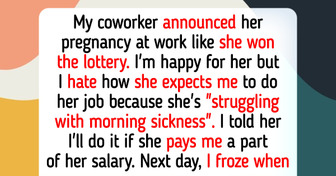
I Refused to Babysit Under My DIL’s Rules—I’m Not “Learning” How to Be a Mom
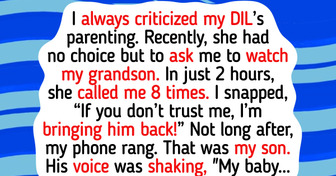
10 Times a Moment of Pure Cruelty Was Actually a Secret Act of Kindness

I Gave My Grandkids Their Inheritance at 18 — Their Stepmom Says I Destroyed Her Blended Family

12 Stories That Prove Kindness Is the Strongest Armor
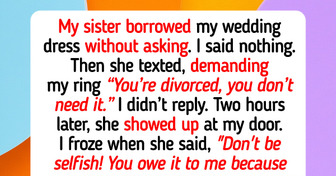
I Refuse to Sacrifice My Retirement to Help My Unemployed Son, I’m Not His ATM
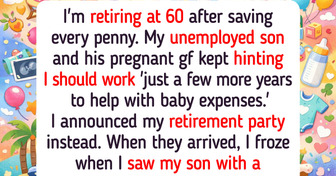
15 Moments That Prove Kindness and Mercy Are Quietly Saving the World

15 Stories That Prove Some Memories Are Impossible to Delete

15 Heart-Centered Moments of Human Kindness That Only Happen Once in a Blue Moon

I Refused to Help My Dad With His Hospital Bills, I’m Not Here to Rescue Him

My Cousin Uninvited Me to Save Money—My Petty Revenge Was Absolutely Worth It

16 Stories That Prove a Dad’s Love Is the Most Powerful Magic in the World

